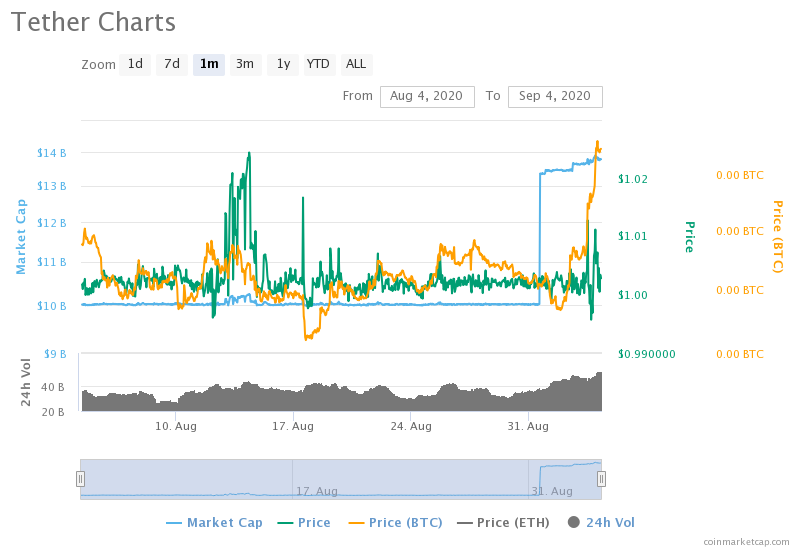Tether has become more mainstream than ever. It ranks third with a market capitalization of $13.7 B with its market dominance having increased by 2.9% since August 31, 2020.

Source: CoinMarketCap
However, this level of dominance and explosive growth makes it an outlier in stablecoins. Tether was introduced as the ‘digital dollar’ for facilitating entry into cryptocurrency markets and trading. However, it has become more instrumental to liquidity on exchanges.
The Tether inflow to cryptocurrency exchanges has increased in the past 30 days.

Source: Chainalysis
Thus it is instrumental in generating liquidity to absorb demand from new buyers. Its ‘digital dollar’ narrative is key here. However, Tether may have started out as a digital alternative to the USD and ended up becoming a significant competitor.
In one glance you do not see how Tether challenges the USD and its relevance in the crypto trading community however, it emerges as USD’s competitor as Fed rate cuts and inflation do not have a direct impact on Tether. The risk associated with Tether is only at the time of exchanging it for USD. Once an investor holds their portfolio in Tether, they are safeguarded from the risks of holding USD. Besides, there are enough rewards associated with Tether to motivate investors to exchange fiat for it.
For starters, trading volume on Tether is much higher compared to that on USD markets. Based on data from CoinMarketCap, BTC/USD trade volume amounted to 20% of BTC/USDT. Tether’s markets are far less concentrated in comparison to USD, but closing prices are similar on both. Other factors crucial to day traders, like volatility and daily returns, differ in both markets. For Tether its market volatility is always higher than USD, which is partly because of high liquidity. Daily volatility and returns can help traders make up to 2.5 times higher than USD markets.
So is Tether killing USD?
In essence, Tether is not just a digital equivalent of the dollar. It does not derive its value from the USD reserve held in a bank, as that would only compensate for a percentage of the Tether in circulation. It’s increasing adoption and market dominance is making it a substitute for the USD rather than an alternative. It is a popular, relevant, and millennial version of a USD, and in economic terms, it’s becoming a perfect substitute for the USD in the crypto market.
So is the stablecoin – Tether challenging the USD in the cryptocurrency market? Maybe, however, Tether does not entirely fit the definition of a stablecoin. A stablecoin is supposed to offer price stability and it is backed by a reserve asset. In the case of Tether, this is partially true.
Stablecoin or not, Tether is no longer just the digital alternative for USD.
The post Here’s how Tether is bringing stiff competition to the US Dollar appeared first on AMBCrypto.